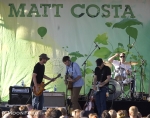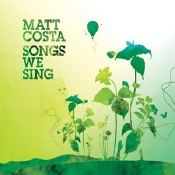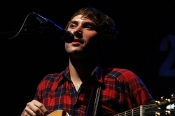|
|
|
Matt Costa |
|
|
Matt Costa is not your run-of-the-mill singer/songwriter. As a teenager, his aspirations were intensely focused on becoming a professional skate boarder. Unfortunately, a major accident resulting in a shattered leg made Costa rethink his career options. During an 18-month rehabilitation, he rekindled his interest in the guitar and turned his intensity to songwriting. Catching the attention of Tom Dumont (No Doubt), with his homemade demo, Dumont took it upon himself to build upon Costa's inherent talent. Fast forward a few years, Costa was invited to be part of this year's Hotel Cafe Tour. During their stop in Chicago, Costa chatted w\th Way Cool Music about his ability to focus on what interests him, his musical education, and why we should pay attention to skate videos. |
|
|
Way Cool: |
Tell us a little bit about your background and how you got involved with music. |
| |
|
| Matt Costa: |

|
|
I’m 24 now. I started playing music when I was really young. I took piano lessons for a month or two. I stopped doing those because I didn’t like reading music; I just liked hearing it and playing it. My parents got me started in music because I was always drawn to whatever instruments were around me, thinking, “Why don’t we get him to learn something?” It didn’t last very long, but from it I got a home keyboard to practice. I had that at home and messed around on it. That was when I was really young.
|
|
| |
|
| |
When I was 10, I joined the school band and played trumpet. When I was 12, I got my first electric guitar. I’ve been playing guitar ever since. I traded that electric guitar when I was 17 for a pair of shoes and a skateboard to a friend. So, I kinda gave that up. But a couple of months before I was 19, I got an acoustic guitar and started learning more stuff and getting into it. Every time there was a guitar around I’d try to learn stuff. Then, I broke my leg skateboarding and naturally fell right into music just because I always had an instrument around. I had the dexterity to play, but didn’t know techniques. So I listened to songs and tried to play them and realized I could do it. I based my own song writing off of the songs I liked. I didn’t really know what I was doing, but the songs got better and better. I recorded them on a little 4-track that a friend gave me. That’s kind of how it all got started. |
| |
|
WC: |
Not the typical story, by any means. |
|
|
| MC: |
The whole time, I never really tried to make a career out of music. That was never my goal. I liked writing and playing and being able to create pictures with music. I liked that idea. I figured that if I was going to do that, I needed to put words to it. I started my song writing very linear, from beginning to end. And that’s how I do it now. When I first started playing guitar, I learned the beginning of every song I loved. The first song I learned was ‘Come As You Are’ by Nirvana, and I just learned the beginning. Once I had that down, I learned the beginning to lots of other songs, like ‘Sweet Home Alabama.’ Then I’d learn the chords. But I’d basically learn the first four lines of every song I’ve ever liked. It wasn’t until I was 18 or 19 that I started learning full songs.
When I started to write songs, I had to figure out how to do it, to find out the first word. How does a songwriter start the story? Is it “Well” or a person’s name? What was it? Basically I’d sit for hours trying to figure out that first word to tell the story. I’ll come up with a beginning riff or one word that I like. When they mesh, when there’s a spark with just the one word and riff, then I figure it’s something worth developing. As I’ve been around music and musicians more, it’s evolved from that technique. It’s feels natural.
|
|
|
WC: |
You like music from past generations. How were you introduced to that music? |
| |
|
| MC: |
When I was really young, I listened to my parent’s radio stations, classic rock and oldies stations. That kind of music always stuck with me because the songs were timeless and catchy. They were pop songs, but there was a craft to it.
When I was in junior high, I started listening to alternative radio and discovered bands like Nirvana and Smashing Pumpkins. That’s when I started my own discovery of music. It quickly went from a year or two of that to watching skate videos and getting into that music. I’d find out about bands they didn’t play on the radio. They were bands that were touring or playing festivals or small clubs. The skate videos mixed that underground music with classic stuff like Led Zeppelin or Black Sabbath or Dylan. That’s how I got into that music. |
| |
|
| |
From there, I just went out and bought the music I’d hear in skate videos. Only a few kids I went to school with had heard of those bands. I’d listen to those records and just discovered some great stuff. My uncle heard me listening to older music and introduced me to other stuff, like America and Donovan. Some of it was folky songwriters. And I really got in the ‘60s pop music like The Beatles.
From there, I thought, “Where did these guys get their inspiration?” Through research, I found out that those bands were into older stuff like Woody Gutherie and stuff from the early 1900s like the Carter Family. A lot of the finger plucking techniques I learned, I got from Donovan, but he got them from the Carter Family.
|
|

|
|
| |
|
| |
I also searched literature to figure out what their influences were. I needed to discover different artistic views and surround myself with those. TV didn’t keep my attention, but reading those things really kept my mind spinning and my imagination going. And I wanted to create the sounds that they were creating. I’d interpret it and make it my own. |
| |
|
| WC: |
How is skateboarding similar to songwriting? |
| |
|
| MC: |
The biggest parallel for me was self discovery. In skateboarding, you’re pushing yourself physically and seeing how far you can take things. The same goes for songwriting and what you can create. You’re pushing yourself mentally to see what you can do. In skateboarding, there’s a formula: one board and two legs. There are only a certain number of tricks you can do. You can only take it so far. But it’s about discovering your personal expression within that formula. The same goes with music. There are 12 notes and a select number of instruments people use. You push yourself, mentally, to create within that limited number of possibilities. Once you create it, you carry it with you forever.
I did school and got by, but skateboarding taught me self determination and discipline. You get out of it what you put into it. Repetition and determination make you better at things. I got that from skateboarding, not school.
Now it’s my job to paint the pictures I used to get from the songs in skate videos. Some of my songs have been in skate videos and I think about these young kids hearing my music through them. Maybe they’re wondering, “Matt Costa. I wonder what his story is.” They have no idea that I was once like them. My music may become a part of that kid’s life. |
| |
|
| WC: |
What’s been the reaction of your skateboarding friends to your music career? |
|
|
MC: |
They are kind of amazed. After I broke my leg, I’d still go and hang out with them. I’d play some of the songs that became the record and they were the first to hear them. I called the CD Songs We Sing because it’s about being in that house with my friends and singing my songs. I romanticized it a little, but that’s what it’s about.
No one ever suspected that it would grow how it has. They have a level of fame in the skateboarding world and in their own communities, but they ask me what it’s like to be successful in music. Music reaches further so it can be a different experience.
|
|
|
WC: |
Songs We Sing is really upbeat. Where is the sadness?
|
| |
|
MC: |

|
|
All the songs I write come from some sort of melancholy place. Most of the songs come from an intense, overwhelming feeling. I’m an optimistic person so when I feel overwhelmed by sadness, I find the optimism. That comes through in the songs. The tunes are catchy and upbeat and they overshadow the darker side of it. But that’s how I view those things in my life, at least for this record.
It’s not something I do intentionally. That’s why I like John Steinbeck’s writing so much. There are real issues and you relate to it. People are living in hard times, under less than ideal situations. You relate to it and see the good aspects of it as well. You see the little things that override the big picture. You realize that the characters may not be as comfortable as someone else, but there are little things in their everyday life that make it special. That’s how my songs are as well. Everyone can relate to the emotions, no matter their lifestyle.
The feeling I get when I finish a song is an overwhelming sense of joy. The point of writing a song, even a sad one, is to get it out. And once it’s out, it’s like a celebration. Music brings people together and makes problems better. It can change a bad day into a good time. |
|
|
|
WC: |
Tell us about your world tour.
|
|
|
| MC: |
I’ve been on tour for months now. We’ve been to Europe three times this year; once with Jack Johnson. Now we’re getting ready to head to Australia for some festivals and headlining shows. Then back to the West Coast at the beginning of the year for a month or so opening for G Love. Should be a great time. |
| |
|
| WC: |
Did Jack get you into surfing? |
| |
|
MC: |
I have a lot of surfing friends. I tried it a couple of times, but it never really caught on. Growing up, I was into skating and everything else was just a distraction from that. I figured if I was in the water, I was taking time away from learning a new skating trick. When I got older and broke my leg, I tried it again, but I wasn’t very good. I got up, but it was a struggle. Everyone was better than me and I was afraid of sharks the whole time. So, I decided I was better sitting on the beach watching everyone else.
|
|

|
|
|
|
WC: |
Now, we'd like to play a game we call "7 Questions." |
|
|
|
|

|
|
|
What's the worst job you've ever had?
|
|
I worked at a movie theater and had to feed people popcorn and microwaved hotdogs. I had to ask families if they wanted to make their already overprice value meal even larger. “You just ordered one large popcorn, two large Cokes, and a candy bar. Would you like to upgrade to the Extra Large Value Meal for $25 more?” A lot of times people would get pissed off at me. One time, a family came in and ordered $200 worth of food and they didn’t really get that much, maybe a 4 drinks, popcorn, and hotdogs. They spent more on their snack than my entire paycheck. That’s when I realized that I was in the wrong job.
|
| |
|
|
What's your favorite movie or lyric quote?
|
|
Movie – From Tombstone - “I’m your huckleberry.” Val Kilmer has a lot of great quotes in that movie. |
| |
|
|
Who would you want to star in the movie of your life?
|
|
I heard that Cate Blanchett is playing one of the Bob Dylans in the upcoming movie on his life. So, I would hope that it wouldn’t be a woman. |
| |
|
|
What's your favorite TV theme song?
|
|
I really liked The Wonder Years (Joe Cocker). Every time it came on with the old film clips of them, it was great. |
| |
|
|
If you were a superhero, what would your name be?
|
|
Crazy Skat Man and I’d just say, “Skoobie bo ska da ska ski.” |
| |
|
|
What do you want to do/be when you grow up?
|
|
I want to be an old man on a porch and I want to be there and have a lot of songs to sing and stories to tell and a bottle of whiskey. I’ll sit there and drink my whiskey and sing my songs and tell my stories. I want to be the man on that porch with my wife next to me. |
| |
|
|
Finally, why are there so many songs about rainbows?
|
|
I don’t know, but I’m doing my best to change that.
|
|
|
|
|
|
To find out more information about Matt Costa, visit his website at www.mattcosta.com. |
|
|
|
|
|
|